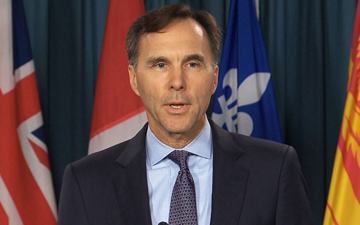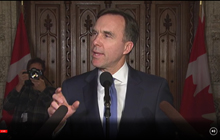What do Canadian accountants want from the federal budget?

Firms looking for fiscal responsibility, tax simplicity, competitiveness
Toronto, March 8, 2019 – With the Canadian government set to release its election year budget in less than two weeks (March 19), the accounting profession is tabling its requests for business and taxation considerations. Finance Minister Bill Morneau has pledged to boost spending to invigorate an economy hit by low oil prices. That will not sit well with Canadian accountants who, across the board, are calling for fiscal responsibility.
Accounting firm RSM Canada says middle market companies are looking for a “more focused” timeline from the government to return to a balanced budget. They want a return to fiscal responsibility and a “proper” mix of income tax and consumption taxes; individuals and companies are already paying higher taxes to cover deficits and spending, with a balanced budget not expected until 2040.
The Liberals forecast in October 2018 the 2018-19 deficit at $18.1 billion, smaller than the revised $18.8 billion in the February 2018 budget.
Dean Landry, national tax leader for PwC Canada, says “it’s always fun look ahead to the upcoming federal budget and, in 2019, it’s going to be an election year budget.” Landry speculates that there could be both corporate and personal tax reduction, especially to offset competitive taxation pressures from tax reduction in the U.S.
In September 2018, PwC Canada released a report, “The Impacts of US Tax Reform on Canada’s Economy,” asserting U.S. tax reductions had eliminated one of Canada’s competitive advantages, and 635,000 Canadian jobs were at risk as a result. PwC Canada prescribed lowering the statutory corporate rate from its current 27 to 20 per cent and adjusting personal income tax brackets to resemble U.S. tax brackets. The reductions would be paid for by a hike in GST (consumption taxes) and broadening the corporate and personal income tax base. Intriguingly, PwC Canada did not dismiss the concept of a carbon tax; it advocated its use to offset corporate and personal tax rates.
RSM Canada wants Morneau to “urgently address” Canadian competitiveness in global markets: “External market pressures combined with economists predicting an economic downturn in the year ahead have middle market companies feeling squeezed.”
Landry warns, however, that “of course, any of these measures, tax reductions, might have to be met with some revenue raisers, to further prevent increases in our annual deficit.” He would like the government to “look for ways to ensure that the tax regime keeps our economy competitive while reducing complexity and remaining adaptable to changing economic pressures.”
RSM Canada is also calling for reduced complexity, especially in the tech sector, where “homegrown digital companies are hoping to see this year's budget reduce complexity in the Canadian tax legislation to help their businesses grow, while allowing for greater innovation and economic growth across the country.” Canada’s tax system, in its opinion, maintains a heavier focus on traditional brick and mortar companies.
As reported by Canadian Accountant, simplicity and competitiveness are also themes of CPA Canada’s tax recommendations, “The Best Way Forward: Designing a Tax Review for Canada.” The national body for chartered professional accountants wants a full-scale tax review that would “make the tax system simpler, fairer, more efficient and competitive so that all Canadians benefit.” Part of this theme is to review personal and corporate income tax rates to ensure Canada is in line with key trading nations.
Landry says that Canadians are very likely to see the “so-called integrity measures continue.” He foresees further measures to reduce losses in tax revenue and measures to improve overall fairness of the tax regime. CPA Canada also calls for a tax code that would “provide fairness for all Canadians … to counter aggressive tax avoidance so that routine tax rules can be made clearer, simpler and provide more certainty, and so that everyone pays their fair share of tax.”
Landry points out that, although Canada has taken steps to combat treaty shopping by signing on to the multi-lateral instrument on base erosion and profit shifting from the OECD, we have yet to follow other countries in tightening interest expense limitations.
Both PwC Canada and CPA Canada agree that a full-scale review of the tax system is long overdue. “More generally, a comprehensive review of Canada’s tax system is long overdue,” says Landry.
By Canadian Accountant staff with files from RSM Canada.









(0) Comments